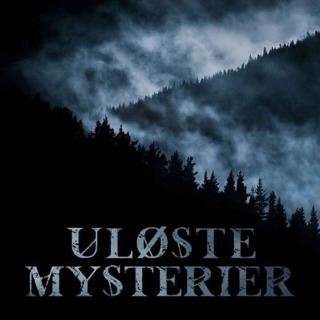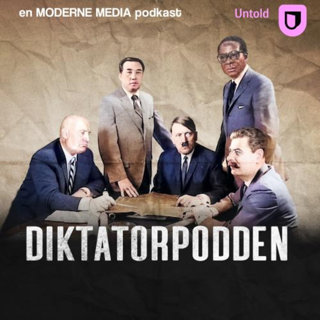
BONUS: Hallie Rubenhold and Julia Laite on We Have Ways...
The murders of The Blackout Ripper - indeed many of the crimes committed against women in World War Two - aren't often spoken about by historians of the conflict. That's changing. The co-host of Bad Women Hallie Rubenhold and regular guest Dr Julia Laite recently appeared on the WW2 podcast We Have Ways of Making You Talk to talk to James Holland about the wartime experiences of women. Here's chance to hear the conversation. See omnystudio.com/listener for privacy information.
15 Des 202244min

S2 E10: Olga Hangs Up Her Whip
Doris had made her living as "Olga" - a dominatrix alter ego charging men handsomely for sex involving corsets, whips and "unusual methods". But when she married aged businessman (and former client) Henri Jouannet, she'd promised to give it all up. The coming of war put a strain on the couple's finances and their relationship - and Doris secretly returned to selling sex. But the trade had changed - instead of seeing her regular clients, "Olga" now meets strangers on the street... including The Blackout Ripper. Further reading: Billock, Jennifer. ‘Five Hotels That Were Occupied by the Military During World War II’, Smithsonian Magazine, 28 October 2019 Laite, Julia. Common Prostitutes and Ordinary Citizens: Commercial Sex in London, 1885 - 1960 (Basingstoke: Palgrave Macmillan, 2012)See omnystudio.com/listener for privacy information.
13 Des 202239min

BONUS: The Music from 'The Blackout Ripper'
The story of the Blackout Ripper partly takes place in the wartime bars and clubs of West End London. To recreate their sound, Bad Women's composer and sound designer Pascal Wyse put together a quartet to play jazz tunes of the time. Here Pascal and guitarist Ed Gaughan talk about the history of that music and play some of the numbers in full on this episode on Pushkin Industries' Broken Record show, hosted by Justin Richmond. The band included Ed Gaughan, Ross Hughes, Christian Miller and Marcus Penrose. They were recorded by Nick Taylor at Porcupine Studios, under the direction of Pascal Wyse. Pushkin’s Ben Tolliday mixed the tracks. See omnystudio.com/listener for privacy information.
8 Des 202259min

S2 E9: The Blackout Ripper on the Run
Greta Heywood is being strangled in a Piccadilly doorway when a passerby interrupts the Blackout Ripper, who disappears into the night. Greta survives the attack and the killer leaves vital clues as to his identity. The police are now closing in on their man - but can they catch him before he can claim more victims? Further reading: Andrews, Maggie and Lomas, Janis. The Home Front in Britain: Images, Myths and Forgotten Experiences since 1914 (Basingstoke: Palgrave Macmillan, 2014) Laite, Julia. Common Prostitutes And Ordinary Citizens: Commercial Sex in London 1885 - 1960 (Basingstoke: Palgrave Macmillan, 2012) Lewis, Jane. ‘The problem of lone mother families in twentieth century Britain’, The Journal of Social Welfare and Family Law, Vol. 20 No. 3 (1998), pp. 251-283 Reeves, Josephine. ‘The Deviant Mother and Child: The Development of Adoption as an Instrument of Social Control’, Journal of Law and Society, Winter, Vol. 20, No. 4 (Winter 1993), pp. 412—426) Roberts, Elizabeth. A Woman’s Place: An Oral History of Working Class Women, 1890 – 1940 (Oxford: Blackwell, 1984) Slater, Stefan. ‘Prostitutes and Popular History: Notes on the ‘Underworld’ 1918 - 1939’, Crime, History and Society, Vol. 13, No. 1 (2009), pp. 25 - 48 Sweet, Matthew. ‘The West End Front' (Faber 2012)See omnystudio.com/listener for privacy information.
6 Des 202240min

S2 E8: Madam Nerva Sees Death
Rachel Dobkin has come to see her psychic advisor, Madam Nerva. After years of bitter disagreements and financial wranglings with her estranged and violent husband, Rachel wants to know what the spirits think she should do next. Through Madam Nerva the spirts tell Rachel not to go near her husband again... but will she heed their warnings? The case of Rachel Dobkin is another face of wartime crime and not the work of the Blackout Ripper - but it reveals a common thread. It shows how some men thought the disruption and chaos of war would help them get away with murder. Further reading: Carroll, Niamh. ‘The History of the Boundary Estate’, Bethnal Green London, 14 May 2021, Cole, Mike. ‘The Battle of Cable Street’, Historic UK. Cowan, Colin. ‘Mental observation wards: an alternative provision for emergency psychiatric care in England in the first half of the twentieth century’, History of Psychiatry, Eilers, Nicole Kvale. ‘Emigrant Trains: Jewish Migration through Prussia and American Remote Control, 1880 - 1914’, in Brinkmann, T. (ed), Points of Passage: Jewish Migrants from Eastern Europe in Scandinavia, Germany, and Britain 1880 - 1914 (New York: Berghahn Books, 2013). Lefebure, Molly. Murder on the Home Front (London: Sphere, 2013). Marks, Lara V, Model Mothers: Jewish Mothers and Maternity Provision in East London 1870 - 1939 (Oxford: Oxford University Press, 1994).. Odell, Robin. Medical Detectives: The Lives and Cases of Britain’s Forensic Five (Cheltenham: The History Press, 2013). Roberts, Elizabeth. A Woman’s Place: An Oral History of Working Class Women 1890 - 1940 (Oxford: Blackwell, 1995). Summerscale, Kate. The Haunting of Alma Fielding: A True Ghost Story (London: Bloomsbury, 2020).See omnystudio.com/listener for privacy information.
29 Nov 202250min

BONUS: Black GIs and their "Brown Babies"
Unlike white GIs, it was made virtually impossible for African-American servicemen to marry the women they met and fell in love with in the UK during World War Two. If these couples had children, those so-called "Brown Babies" were stigmatized and scorned - with many ending up in grim children's homes. Pausing the story of the Blackout Ripper - this episode examines the experiences of those Black GIs, their white partners and two "Brown Babies" - Leon Lomax and Terry Harrison - who have both spent decades trying to piece together their family histories. Professor Lucy Bland's work can be seen here: http://www.mixedmuseum.org.uk/brown-babies Further reading: Bland, Lucy. Britain's 'Brown Babies': The stories of children born to black GIs and white women in the Second World War. (Manchester University Press), 2019 Osur, Alan. Blacks in the Army Air Forces During World War II. (Office of Air Force History), 1977 Schindler, David and Westcott, Mark ‘Shocking Racial Attitudes: Black G.I.s in Europe’, The Review of Economic Studies. (University of Oxford), 2021See omnystudio.com/listener for privacy information.
22 Nov 202233min

S2 E7: Shootout at the Dress Shop
Seamstress Doris Staples doesn't want to see Private John Waters any more... but the American soldier has other ideas. He goes to her workplace to make sure she doesn't "step out" with any other man... and carries with him a pistol. Men were expected to seek an outlet for their sexual appetites, but any women who saw multiple partners or wanted to exit a relationship faced stigma, hostility and deadly violence. Further reading: Ashton, John R; Machin, David; Osmond, Clive; Balajaran, Rasaratnam; Adam, Sheila A and Donnan, Stuart P B. ‘Trends in Induced Abortion in England and Wales’, Journal of Epidemiology and Community Health, vol. 37, 1983, pp. 105 - 110. Dryden, Steven. ‘A Short History of LGBT Rights in the UK’. Ellwood, David. ‘The American Challenge in Uniform: The Arrival of America’s Armies in World War II and European Women’, European Journal of American Studies vol. 7, no. 2, 2012. Laite, Julia. Common Prostitutes and Ordinary Citizens: Commercial Sex in London, 1885 - 1960 (Basingstoke: Palgrave Macmillan, 2012). Monckton Smith, Jane. In Control: Dangerous Relationships and How They End in Murder. (Bloomsbury Publishing, 2022). Vickers, Emma. Queen and Country: Same-sex desire in the British Armed Forces, 1939-45. (Manchester University Press, 2013). Wagner, Paul. The Youngest Crew (Cheyenne, WY: Lagumo Press, 1997).See omnystudio.com/listener for privacy information.
15 Nov 202244min

S2 E6: "The Lady" of Gosfield Street
Around Piccadilly she's known as "The Lady" - a quiet, rather remote figure. Widow Margaret Lowe tries to keep herself to herself and stay out of trouble - but trouble is never far away. The other residents of her building on Gosfield Street are used to hearing crashes and cries in the dead of night. Margaret sells sex in her flat, and with the coming of war that's an increasingly dangerous business. But when her clients turn violent, "The Lady" can't turn to the police and her neighbours seldom lift a finger to help. One night the man she brings the up stairs to her door is... the Blackout Ripper. Sources: Laite, Julia. Common Prostitutes and Ordinary Citizens: Commercial Sex in London, 1885 - 1960 (Basingstoke: Palgrave Macmillan, 2012). Laite, Julia. The Disappearance of Lydia Harvey: A True Story of Sex, Crime and the Meaning of Justice (London: Profile Books, 2021). Philips, Jock. ‘History of Immigration - Depression: 1885 - 1900’, Te Ara - The Encyclopedia of New Zealand. Philips, Jock. ‘History of Immigration - The Great Migration: 1871 - 1885’, Te Ara - The Encyclopedia of New Zealand. Philips, Jock. ‘History of Immigration - Migration: 1900 to 1914’, Te Ara - The Encyclopedia of New Zealand.See omnystudio.com/listener for privacy information.
8 Nov 202247min





















